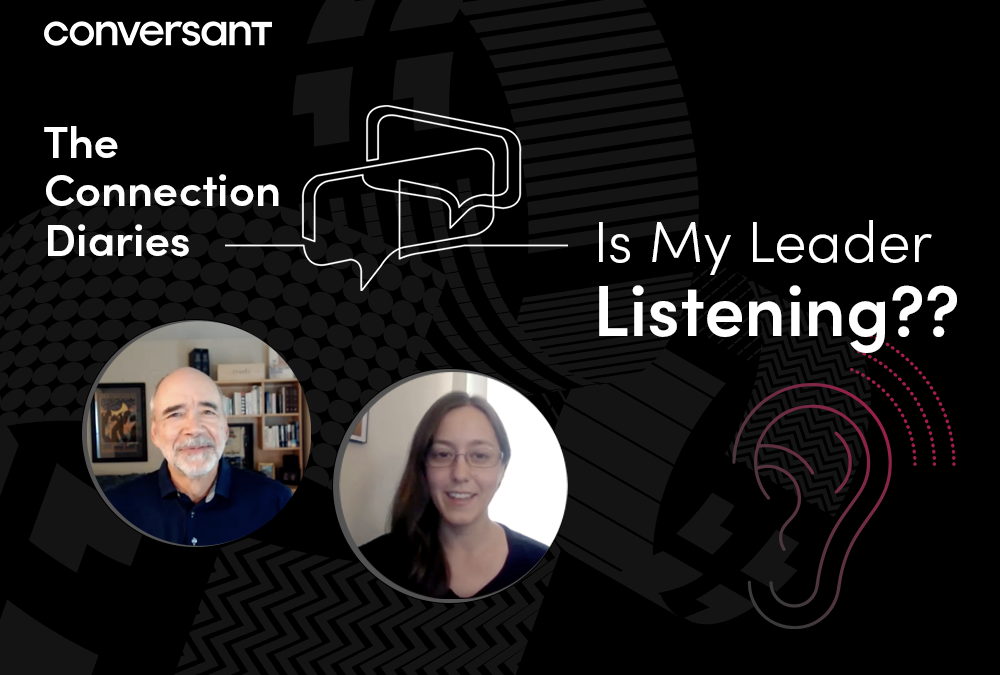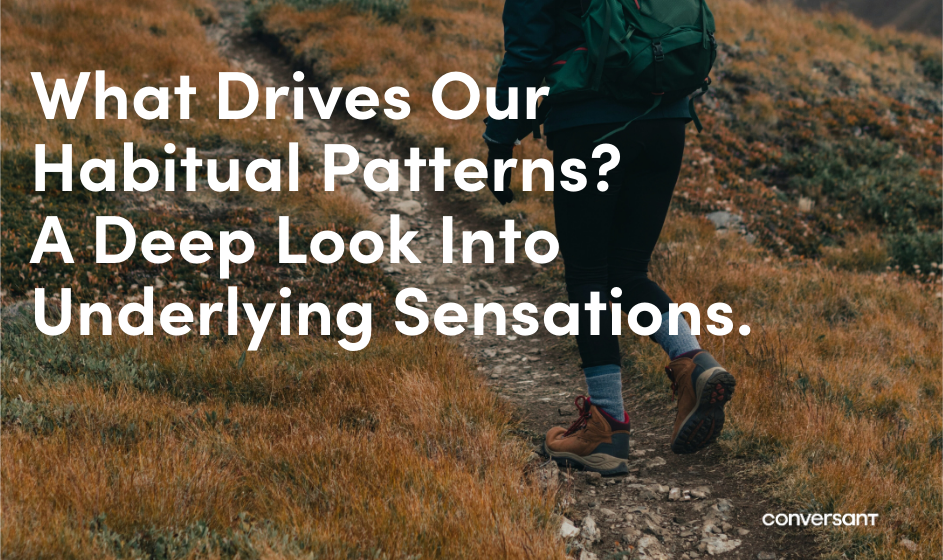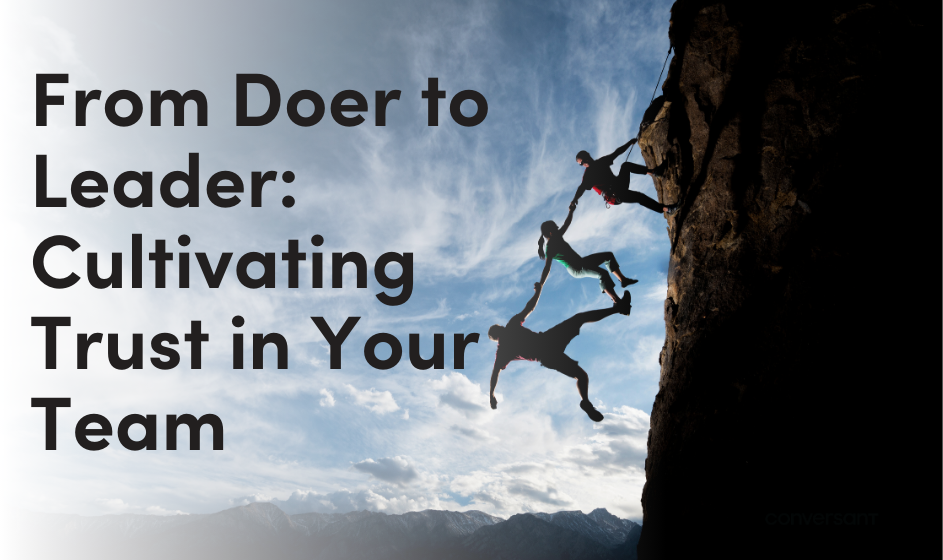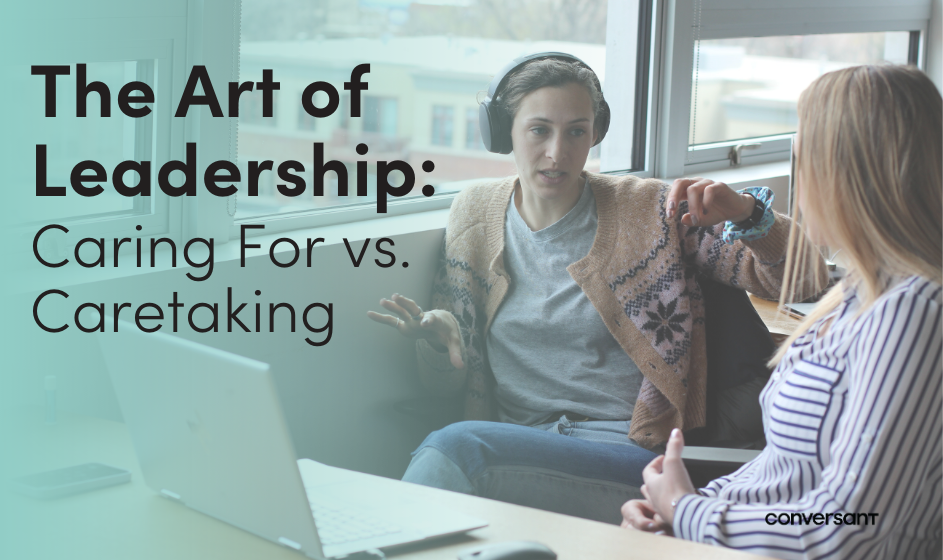If conversations are the work of leadership, listening is one of the most powerful skills a leader can seek to improve. There is a magical moment in conversations where people switch their focus from proving a point or defending their perspective to truly listening to another. By leading with curiosity, we leave room for greater alignment and new insights we wouldn’t have come to alone.
What is there for me to learn? What about this person’s perspective, no matter how different from my own, may be valuable? Am I open to being surprised, or stubborn in my own perspective?
Mickey Connolly and Katie Mingo give their advice for becoming a leader who really listens, one who builds stronger, more authentic connections and drives greater value as a result.
You can find a full transcript of this video below. Explore all past episodes of The Connection Diaries here or on our YouTube channel, and don’t forget to connect with us on LinkedIn.
Full Transcript
Katie: Hi everyone, this is Katie Mingo from Conversant. I’m joined by my colleague Mickey Connolly. Thanks for joining us for another installment of the Connection Diaries. I’m excited to talk with Mickey today about a topic that’s really dear to me, that we think that there is a moment in conversation—and a magical moment—where people transform from just taking turns speaking at one another to really taking the time to learn from each other, and that that moment is really what starts to create value in a conversation and really propels people forward. And furthermore, we believe that there’s a design to that moment, and that’s what we’d like to talk with you about today and share some stories and practical tips around. So Mickey, I’ll start with you, just what do you think about that idea that there’s a design to creating a magical moment in conversation?
Mickey: Well, you know you’re the one who first said that, and I got all inspired by it so—I love the notion of there’s a design to magic. So, if y’all like that, Katie said it; I just like it. And I do think there is a design to that moment, and it starts by appreciating something which is, in our 30-plus years of doing this, one of the things that we’ve discovered around the world with humans everywhere is that listening is not neutral. So some people just think they’re listening or not. We’re always listening; the question is, what are we listening for? And most human beings have a default radar, a default spirit that they’re listening for, and it tends to come in two dangerous areas. So I’m either listening for protecting what I already think, what I already have; or I’m listening for confirming what I already know, what I already believe, or what I wish was true. And this protection bias, or confirmation bias, have been through legendary studies that show that human listening is constrained by that bias. And so we miss all kinds of things because of that. Well the first thing that we’ve learned about the design of the magic is that, what if we went from thoughtless bias to intentional bias? What if we had a bias on purpose? And the one that we’ve discovered over the years works beautifully is my bias is for learning from you. That if we make the test for listening learning, what I’m for is discovering something from you that I did not have and could not have without having engaged with you. That’s actually the beginning of the magic.
Katie: I love that. Yeah, there’s something about just assuming that we will have bias. It’s not trying to eliminate it but saying we will no matter what, and how do you shape that into something productive. Mickey, I think you had a—you had a story around this too, didn’t you?
Mickey: Yeah, well you know we talked about that, that I’m… one of the things I was really affected by—I love leaders who have humility because I myself, as some of you know have been threatening to write a book called the Back Road to Brilliance, which turns all of my biggest mistakes into lessons. And somebody who did that who I admire, Scott Cook, who was the founder of Intuit, and he talks about how for several years after they introduced Quicken, he kept getting feedback from people that people are using this for home businesses or small businesses, and he said no, you just don’t understand, they’re just talking about using this family planning financial software solution, they’re doing it while they’re at work or something. It’s not really a business software. And he said it was almost four years into that, but it happened so much the people who worked with him said, “you’ve got to pay attention to this.” And when he finally did, they found out that people all over the world were taking this family money management tool and using it for small business because it was the only small business application that doesn’t require you to understand debits and credits. And he said when he finally let that in, then they rebranded this and redesigned it as Quickbooks, which became the largest source of revenue and profit for that company. And so I think there’s a readout in the world and—if that’s the story you’re referring to, Katie. I really like that one.
Katie: Yeah, absolutely. I think what strikes me the most about that is exactly what you said around, he had to be open to the idea that it could be something other than what he expected, so it’s really talking about, okay, he did have to learn something new, and there’s that sort of emotion associated with that surprise. It’s not just new data, but that, like, aha moment.
Another thing that we like to say often—and Mickey and I were talking about this just now—is that difference plus trust equals brilliance. And so, I think it’s really important to really consider whether or not we are inviting that difference, whether we are open to seeing if something is different from our point of view or the way it’s expected. And one thing that I’ve tried to introduce for myself is just thinking back on the last conversation and going, did that conversation, did that meeting go exactly as I thought it would? If I had been asked to play it out moment by moment before the conversation itself, did everything go according to that plan or that agenda? Was there any room for learning something new, for something to go on an unexpected path? And that’s—that, I think, for me at least, has helped me see if there’s anything else to explore that still holds us true to a purpose but leaves room for new discovery as well.
Mickey: I think that’s a beautiful idea if people really want to strengthen their listening, do a surprise audit after meetings or conversations you’ve been in. Did anything happen that was really a moment of discovery? It wasn’t just confirmation it was—oh! So I really like that, that you’ve been conducting surprise audits, Katie, and I think a lot of us could learn from your example, and we would grow stronger from doing that. I also like the way you brought that “differences plus trust equal brilliance” up on the heels of the Intuit story because, what happened there is, he wasn’t listening for difference. He was listening to explain away difference. So, people were saying things that didn’t fit with what he already thought, and so it took him a while where he finally caught that he wasn’t even exploring this. It wasn’t a voyage of discovery, it was a voyage of dismissal, actually. And that’s why I think it’s extraordinary that he owns that and says, “I was a demonstration of confirmation bias.” So do we actually look for difference, or do we listen to minimize it, to be right and make the difference wrong? So I think it’s really powerful that you brought that up. And with all the conflict in the world, if we actually learn from difference before we tried to influence it, there’s extraordinary things that could come from that. But I think we’re too quick to try to change people into us. Quick as in, before we even know what’s different and worthy of our regard about them.
Katie: Right, it’s instantaneous, that opinion forming and that holding to an immovable opinion happens quicker than we really acknowledge it. I love what you’re saying, Mickey, about, is there a way to suspend that opinion for a moment to really be open and discover from others?
Mickey: Well Katie, you recall that we did that recording years ago on high-performance collaboration, and one of the laws in there is to hold our opinions lightly. It’s not as though we don’t have opinions, but can we let them rest? Can we let them sit while we indulge in discovery and see what we can find that’s outside of our own point of view? And we have seen there is a design to that, and the first part is, am I interested in what your distinct purposes, concerns, and circumstances are? So the first move is listening for their purposes, their concerns, their circumstances. That right away will have you see some difference between my own because nobody has exactly the same situation. And the second thing is to be contributed to by them, to discover something, as you were talking about, that moment of surprise where you—wow, I hadn’t thought that, or I’d never realized that. Can I be here, respectfully interested in what’s legitimate and worthy of my regard about your position? And then the third thing is, where does your situation and mine—where do they contribute to one another? Where do they intersect?
As some people know from many, many years ago, somebody who trained me in really high stakes negotiations used to say, “every villain is a hero in his own story.” And so, even people who’ve been in those kind of ugly situations like hostage incidents, the great ones go in there to try to understand what, from that person’s point of view, has them be legitimate and worthy of my respect? It’s that kind of discovery that leads to ways to resolve things without bloodshed. So, this is not saying that everybody you talk to is going to be doing things you approve of, standing for things that you can endorse. It does mean no matter how extreme or subtle the difference, we can learn from it and have that learning be the basis for everything that comes after, and I think, Katie, that’s the design of the magic.
Katie: Mickey, that’s beautiful. I love that distinction between endorsing and respecting or legitimizing another point of view and allowing that to merge back with a shared purpose. Well, thank you very much for engaging in this conversation with me, Mickey. I know that I have learned a lot just in the last few minutes, and I hope all of our listeners have, too.
Mickey: Well, I have as well, because I love that you got me to get that it’s magic. And there’s a design to magic, and that you brought back for me something I’d lost, which is that, hold your opinions lightly. Don’t dismiss them. But perhaps I can give up my addiction to them. So thank you for all that; this is refreshing and I appreciate it. This was your idea, I’m glad we did it, and I hope for all of you who are listening to this it was worth the 10 minutes of your life. Thanks, everybody.
Katie: Thanks, everyone.




